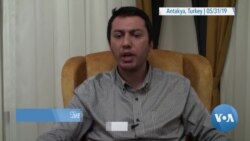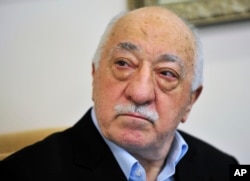A Turkish-American scientist who was recently released from three years in a Turkish prison said Friday he wants to return to the United States and his former job at NASA.
Serkan Golge, a naturalized U.S. citizen, was freed Wednesday shortly after U.S. President Donald Trump and Turkish President Recep Tayyip Erdogan spoke by telephone.
Golge is on probation and has been staying in his family home in Antakya, a southern Turkish city near the Syrian border.
Not so much as a traffic ticket
Golge told VOA Friday during an interview in his home that the conditions of his release prohibit him from returning to the United States.
“I am on probation now,” Golge said, saying he must “go to a local police station four days a week.”
Golge said his passport has been returned to him, but said he does not want to violate his probation conditions by leaving the country.
“I have never violated any laws in my life, neither in Turkey or in the United States. I don’t even have a traffic ticket,” he said.
Arrested in wake of coup attempt
Golge was on a family visit in southern Turkey when he was arrested in July 2016 in the aftermath of a failed military coup against President Erdogan.
Turkey blames the coup on supporters of exiled Muslim cleric Fethullah Gulen, who lives in the United States, and Turkish authorities charged Golge with ties to Gulen.
Golge was sentenced in 2018 to 7½ years in prison despite U.S. State Department protests that there was no credible evidence of wrongdoing. A Turkish appeals court subsequently reduced his sentence to five years.
Golge told VOA he always objected to the “unfounded claims” against him.
Golge’s wife, Kurbra, told media outlets this week she is joyful about her husband’s release, but said he is not allowed to travel to the United States.
President Trump said in remarks to reporters Thursday that Golge would “pretty soon” be able to leave the country. He also thanked Erdogan for releasing Golge.
Meeting at G20
Trump and Erdogan are to meet at next month’s Group of 20 summit. The United States and Turkey are at odds over Turkey’s plans to acquire a missile defense system from Russia. They also have disagreements over Washington’s support of Kurdish rebels in Syria and the U.S. government not extraditing Gulen to Turkey.
At the time of his arrest, Golge was working for the U.S. space agency in Houston, studying the effects of radiation on astronauts.
“I would love to go back to NASA,” Golge said. “I’m a scientist and I’ve been away from science for three years.”







